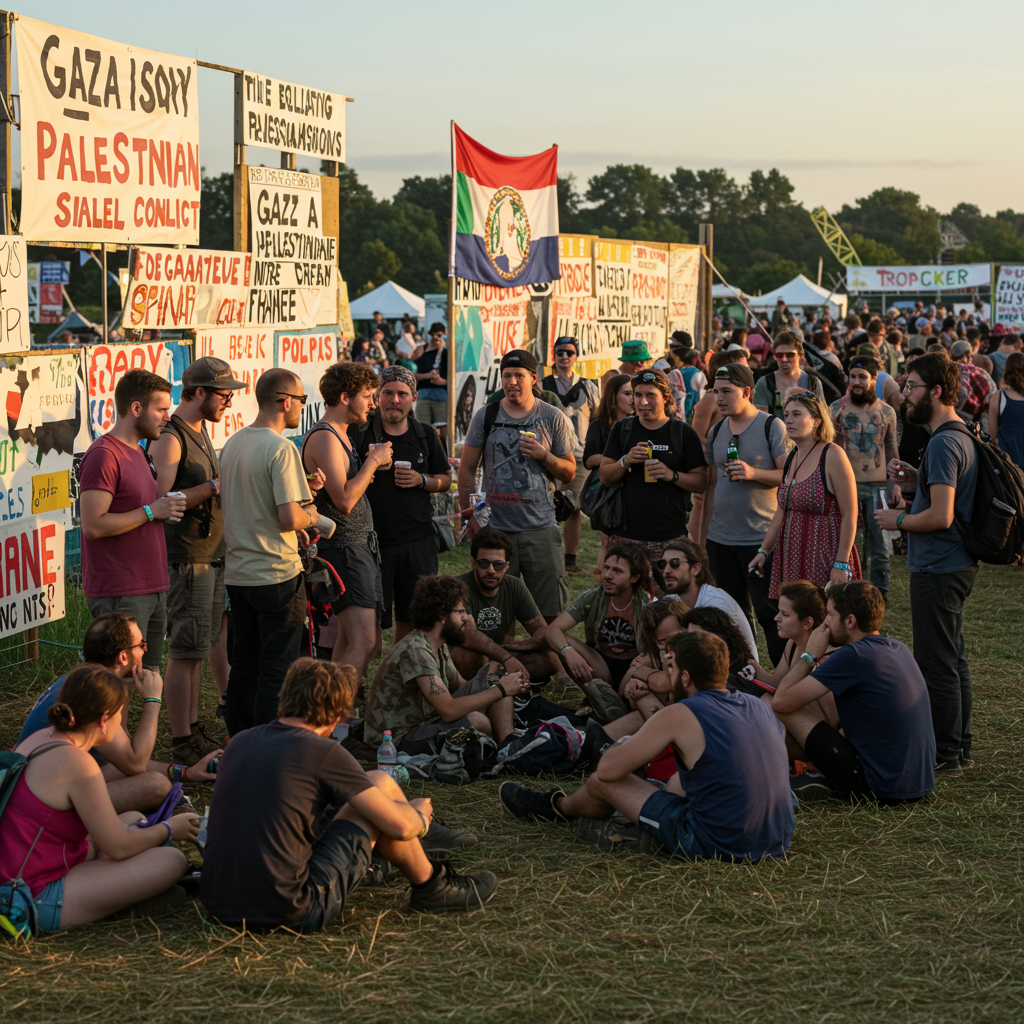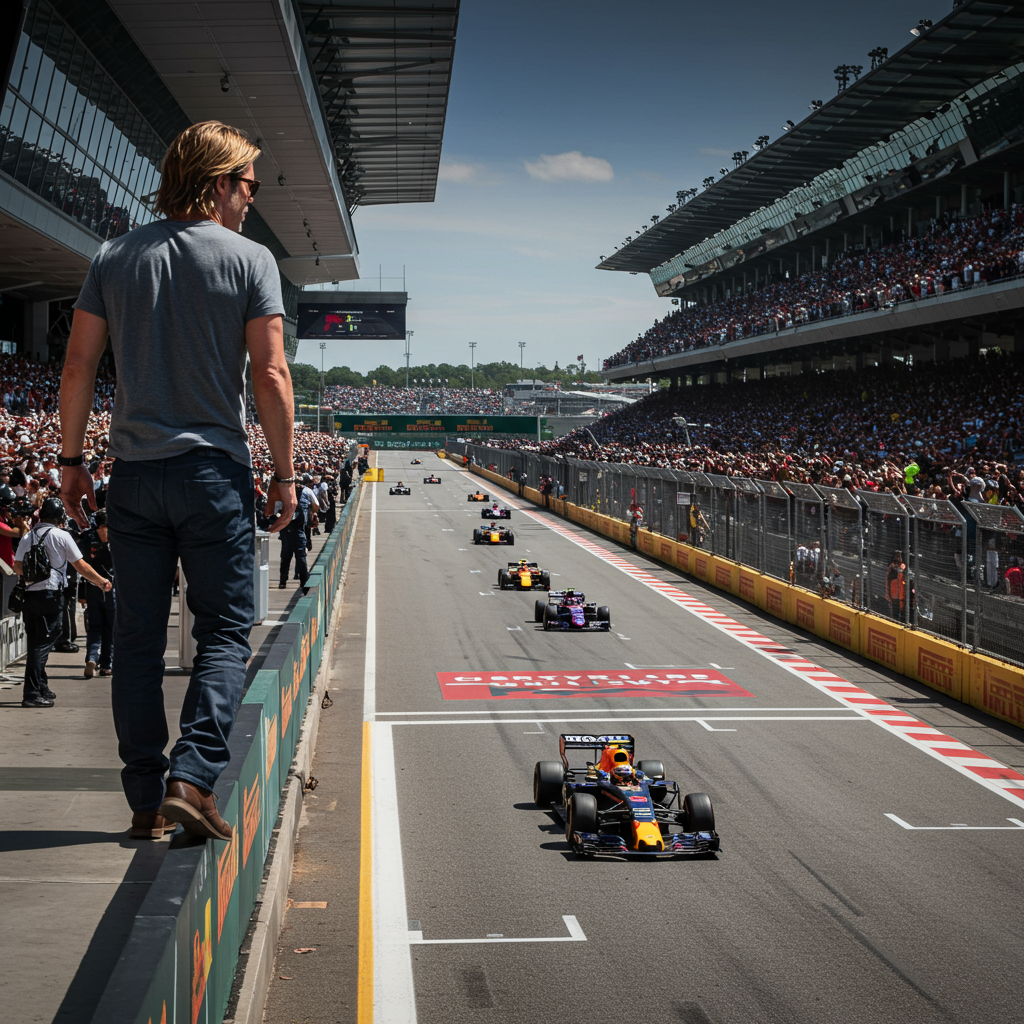glastonbury, the world-renowned music festival, often serves as a vibrant platform for political expression. Yet, a recent installment saw passionate demonstrations concerning the conflict in Gaza spark a significant debate. The core tension? Whether the specific style of anti-Israel sentiment displayed by some attendees and performers overshadowed the crucial humanitarian issues faced by Palestinians in Gaza.
Critics observed instances where the messaging focused heavily on condemnation of Israel, sometimes expressed through provocative slogans or imagery, raising questions about whether this approach effectively advanced awareness or empathy for the suffering within Gaza.
Political Expression Takes Center Stage
Large cultural events like Glastonbury inevitably become melting pots of diverse viewpoints, including strong political stances. At this year’s festival, expressions of solidarity with Palestinians were prominent. Reports noted actions such as individuals displaying large Palestinian flags or artists incorporating political messages into their performances. One notable example described a woman at a separate London street festival displaying a large Palestinian flag, her attire incorporating the kaffiyeh, while holding a beverage. This visual, though not directly at Glastonbury, encapsulates the kind of public expression seen around the issue that drew commentary.
Discussions surrounding artists like the band Kneecap also emerged, specifically their lyrics and public statements that include harsh criticisms of the Israeli military. Their performance style and lyrical content, featuring calls like “Death to the IDF,” ignited controversy. While proponents argued this reflected a deep-seated solidarity born from experiences of political conflict in their own history, others viewed it as inflammatory and counterproductive to constructive dialogue.
Navigating Nuance in Activism
The debate at Glastonbury highlights a broader challenge within global activism: balancing fervent political messaging with the goal of generating understanding and support for a cause. Critics of the focus on “anti-Israel posturing” argue that overly simplistic or aggressive slogans risk alienating potential sympathizers who might otherwise be moved by the humanitarian crisis in Gaza. They suggest that while anger is understandable given the scale of suffering, the form of protest matters and can impact its effectiveness. Focusing solely on condemning one side, they contend, can detract from detailing the urgent needs of Gazans – access to aid, medical care, safety – or addressing the complexities of the situation, such as the status of hostages held since October 7th.
However, many passionate activists counter that strong language is necessary to reflect the severity of the situation on the ground. They view calls for dismantling forces perceived as responsible for widespread death and destruction as a legitimate response to a crisis. They argue that dismissing such expressions as mere “posturing” ignores the depth of conviction and the detailed information activists often share alongside slogans, such as legal definitions of genocide or accounts of civilian casualties.
The Israeli Context and Protester Motivation
Understanding the context informing some of the protest rhetoric requires acknowledging internal Israeli dynamics as well. Critiques of the Israeli government are not limited to external activists; prominent Israeli figures have also voiced severe concerns. For instance, former Prime Minister Ehud Olmert has been highly critical of the current government under Benjamin Netanyahu, accusing hardline ministers of pursuing an agenda leading towards broader conflict and even supporting actions aimed at expelling Palestinians from the West Bank. Olmert has explicitly linked the failures leading to the October 7th attack to Netanyahu’s “overconfidence and arrogance.”
Furthermore, within Israel, there are significant concerns about the potential weakening of democratic checks and balances. Legal experts like Professor Yaniv Roznai have warned that proposed legislation, such as the ‘override clause,’ could severely diminish the power of the judiciary to protect basic rights and consolidate excessive power within the ruling coalition, raising alarms about the future of Israeli democracy.
These internal critiques and concerns about government policies and actions, alongside the devastating impact of the conflict in Gaza and the West Bank, provide crucial context for the anger and calls for radical change expressed by protesters at events like Glastonbury.
The Complexity of Solidarity and Criticism
The commentary surrounding the Glastonbury protests also touched upon complex themes like the history of solidarity movements and accusations of “pinkwashing.” For example, the band Kneecap, hailing from Northern Ireland, operates within a historical context where solidarity with the Palestinian cause has long been visible, drawing parallels between their own experiences of conflict and occupation and that of Palestinians. From their perspective, their activism is deeply rooted and informed, not superficial posturing.
Accusations of “pinkwashing” – suggesting Israel promotes its relatively progressive stance on LGBTQ+ rights to distract from its policies regarding Palestinians – were also raised in the debate. Conversely, defenders of Israel point to the dire situation for LGBTQ+ individuals in Gaza under Hamas rule. These exchanges underscore how deeply intertwined and contentious different facets of the conflict become in public discourse.
Crucially, the debate over the specific messaging at Glastonbury should not obscure the fundamental humanitarian crisis in Gaza, where a large civilian population faces starvation, displacement, and ongoing violence. While disagreements persist on the most effective ways to protest, the underlying reality of immense suffering remains the driving force behind much of the activism seen at cultural events worldwide. The challenge lies in finding ways for protest to be both passionate and productive in advocating for genuine relief and resolution.
Frequently Asked Questions
Why did protests about Gaza at Glastonbury spark debate?
Protests at Glastonbury regarding the conflict in Gaza sparked debate primarily over the form of the activism. Critics argued that some expressions, focusing heavily on aggressive anti-Israel rhetoric and slogans like “Death to the IDF,” amounted to posturing that overshadowed the humanitarian crisis in Gaza itself. They felt this approach risked alienating potential support and lacked nuance compared to focusing on the suffering of Gazans or the specifics of the conflict’s impact on civilians.
What specific types of messaging were debated during these protests?
Debated messaging included prominent displays of Palestinian flags, slogans condemning Israel or the Israeli military (“Death to the IDF”), and performances by artists incorporating strong political lyrics critical of Israel. The controversy centered on whether these direct, often confrontational, expressions were effective advocacy or if they detracted from addressing the complex humanitarian situation in Gaza, potentially reducing support among those who might be put off by perceived aggression or lack of detail.
How do the protests connect to broader political issues concerning Israel?
These protests connect significantly to broader political issues within and concerning Israel. Activist messaging often implicitly or explicitly reacts to the actions of the Israeli government and military in Gaza and the West Bank. External criticisms from figures like former PM Olmert regarding government policies and failures, as well as concerns about democratic checks and balances within Israel highlighted by legal experts, provide a complex backdrop for the anger and specific demands voiced by protesters internationally, including at events like Glastonbury.


